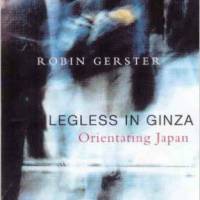Invited for a two-year stint at the University of Tokyo, professor Robin Gerster set about "orientating" himself in Japan by exploring the possibilities of adapting the country to his own needs.
Legless in Ginza: Orientating Japan, by Robin Gerster.
256 pages
Melbourne University PRESS, Nonfiction.
Gerster, a voracious reader of books on Japan, manages to avoid the well-trodden pitfalls of many inferior books in this travelogue and memoir. There are no faux pas over bathing customs or toilet slippers, no entanglements with chopsticks. "Legless in Ginza" is instead an earnest endeavor to get to the heart of things.
The author is billeted in university accommodation in Kemigawa, a city in coastal Chiba Prefecture that locals charitably call the "Bay Area." Gerster's descriptions recal William Gibson's reference to Chiba in the opening of "Neuromancer": "The sky above the port was the color of television, tuned to a dead channel."
Gerster must be commended for maximizing his short time in Japan. Nothing that interests him is left unexamined. Taking the congested train into Tokyo every morning, he struggles with the logistics of comfortably reading the pages of The Japan Times, finding that the task requires the skills of "an origami master." Gerster has high praise for the paper, finding its economic coverage riveting, the book page interesting, particularly the reviews produced by members of a community of "foreign litterateurs beached in Japan."



